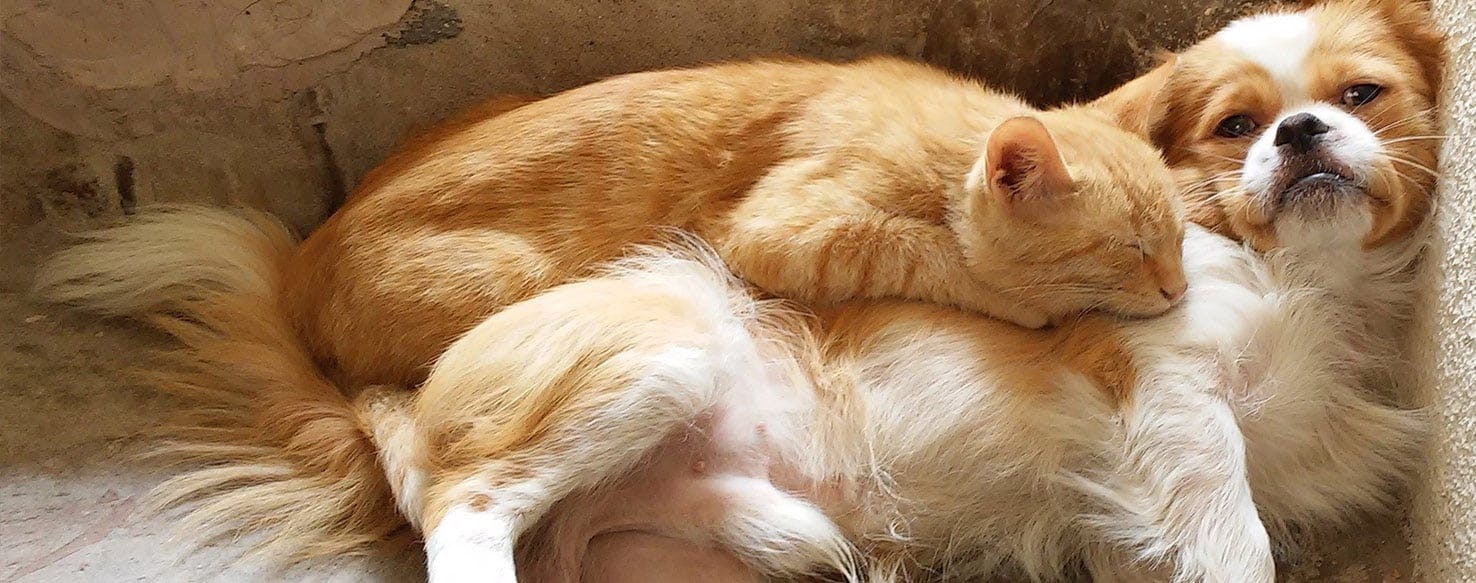- Home
- Dog Wellness
- Can Dogs Get a Stomach Virus From Cats?
3 min read
Can Dogs Get a Stomach Virus From Cats?

By Darlene Stott
Published: 07/18/2017, edited: 09/07/2022
Save on pet insurance for your pet
You don't have to choose between your pet and your wallet when it comes to expensive vet visits. Prepare ahead of time for unexpected vet bills by finding the pawfect pet insurance.
Overview
Dogs are known to be one of the most expressive animals on the planet. Even a little change in their body language, if watched closely, can be a cause for concern for most pet parents. Knowing your dog from his or her habits, appearance, appetite, behavior and even the look on your pet's eyes can be the easiest way to determine whether or not there's something wrong underneath the surface. The stomach flu, or gastroenteritis, is a health trouble that your dog may encounter, and it's relatively easy to spot and to treat.
In humans, gastroenteritis is often called stomach flu. It is an infection of the intestine caused by a virus and symptomized by watery diarrhea, vomiting or nausea, abdominal pains, and fever.
It is usually transmitted through contact with a person infected with the virus or by ingesting contaminated water or food.
Once it affects the host, it is important to keep up with a liquid intake to prevent dehydration, especially liquids that would help replenish the body's electrolytes.
Can dogs get a stomach virus from cats?
NO!
Most diseases are species-specific, meaning the viruses that affect dogs don't usually affect cats and vice versa. Although there are viruses that affect both cats and dogs like rotavirus, they really can't jump from one species to the other.
Gastrointestinal troubles in dogs can be caused by infectious agents and viruses such as rotavirus, norovirus, sapovirus and parvovirus. Gastroenteritis itself can occur because of dietary indiscretions, bacterial infections, tumors, toxins, and other systemic infections. But it's not originated or transmitted from cats.
How do I treat my dog's stomach virus?
According to Dr. Callum Turner of Vetary.com, viral gastroenteritis can be managed by focusing on the treatment of the symptoms rather than the condition itself since your dog loses a lot of fluids because of vomiting and diarrhea. Some veterinarians may even tell pet parents to withhold food to allow the dog's gastrointestinal tract to rest. Once improved, you may introduce soft, bland food to ease in on your dog's diet.
Most of the time gastroenteritis can be treated at home as long as fluids are provided sufficiently. It may be a cause for concern when the symptoms do not clear after a few days or if additional signs appear. In this case, you must take your dog to the veterinarian for further examinations to determine the causes and for a more targeted treatment.
You can visit a related guide online at Gastroenteritis in Dogs to learn more about gastroenteritis in dogs, read the experience of other pet parents and even get your questions answered by an in-house veterinarian.
How is a gastroenteritis similar in dogs, cats and humans?
Gastroenteritis in dogs has several similarities with gastroenteritis in cats and humans, which show the same symptoms, have similar causes, and respond to the same treatment:
Gastroenteritis is an inflammation of the intestinal tract that causes vomiting and diarrhea.
It may originate from dietary indiscretion or the consumption of inappropriate things.
Vomiting and diarrhea lead to dehydration, electrolyte imbalance, and decreased appetite.
In all species, it is important to replenish the blood electrolytes levels, so hydration is key.
How is a gastroenteritis different in dogs, cats and humans?
In dogs, gastroenteritis is often accompanied by:
Lethargy
Depression
Blood in their vomit
Blood in their feces
In humans, the appearance of blood might mean something more serious.
Case Study
Stomach flu in cats and dogs are more or less the same, but as mentioned, it can’t be transmitted from dog to cat or cat to dog because these viruses are species-specific.
To prevent the risks or minimize the chances of acquiring gastroenteritis, your pets must be given the appropriate diet, and food scraps and garbage must be avoided at all costs.
You may also like
